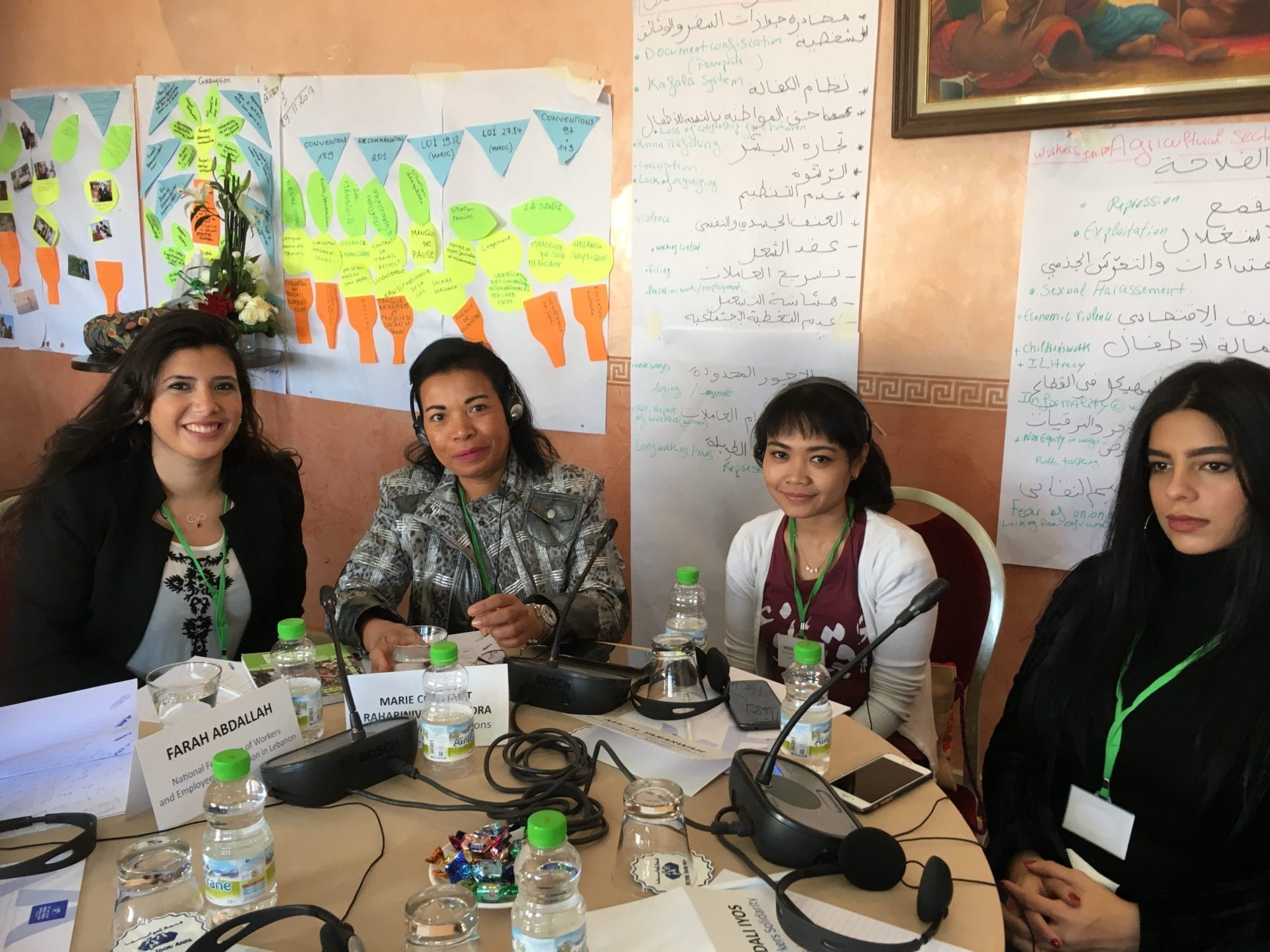
Dec 1, 2017
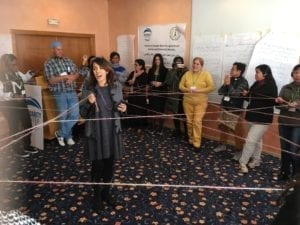
Worker rights advocates from across the Middle East and North Africa strategized and networked over three days in Casablanca, Morocco. Caption: Solidarity Center/Tula Connell
Ending human trafficking. Ensuring all employers treat workers fairly. Giving voice to migrant workers around the world. Creating a world in which women are treated equally to men.
These are some of the broad goals participants at the Solidarity Center Forum on Decent Work Forum for Agricultural Women and Domestic Workers identified in a morning ice breaker on the final day of the November 29–December 1 conference in Casablanca.
“If I had a magic wand, I would do away with all oppression. I would do away with all inequalities,” says Farah Abdallah, with the National Federation of Employees’ and Workers’ Unions in Lebanon (FENASOL).
Some 30 participants at the conference then explored how to put their hopes and dreams into action, building on two days’ discussions in which they shared their challenges and successes in winning worker rights on farms and in households throughout the Middle East and North Africa.
Sponsored by the Solidarity Center and the Democratic Labor Confederation (CDT) in Morocco, the Forum includes representatives of unions and worker associations from Jordan, Kuwait, Lebanon and Morocco.
Creating Positive Change Takes Collective Action
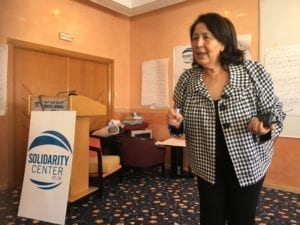
Making positive change takes the kind of collective strength workers gain in unions—Kalthoum Barkallah. Credit: Solidarity Center/Tula Connell
Participants proposed lobbying government and advocating for national laws covering worker rights as key steps forward. For instance, several participants discussed the need to press for an end to the kefala sponsorship system in Arab Gulf countries which ties migrant workers to their employers, effectively denying them all fundamental rights.
Campaigning for ratification of International Labor Organization (ILO) conventions like those covering domestic worker rights also is key, participants say, as is regulating labor brokers who often charge migrant workers exorbitant fees and give them false information on wages and working conditions.
Yet as Kalthoum Barkallah pointed out, it takes collective action to successfully press for laws and create broad change. And collective action means workers joining together in unions or associations—and connecting with other kindred groups.
“One association cannot achieve a lot. You must have a network of people and organizations for our lobbying efforts to be strong enough to change the mind of decision makers,” says Barkallah, Solidarity Center senior program officer in Tunisia, who led the day’s sessions.
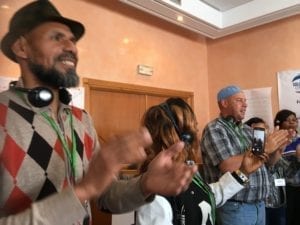
Bouhaya Adiabdelali, a farm worker and union steward from Morocco, joined more than two dozen worker rights advocates for a Solidarity Center forum in Casablanca. Credit: Solidarity Center/Tula Connell
“We have seen throughout our conference that the conditions for decent work do not exist in many places. It is incumbent upon us as civil society to address that.”
“No worker is an unorganizable,” says Elizabeth Tang, general secretary for the International Domestic Workers Federation (IDWF), sharing her experiences working with domestic workers in Hong Kong, SAR and around the world. “Women, men, migrant, old, young—they all can join unions, they can all be organized.”
Tang gave the example of Malaysia, where it is not legal for migrant workers to form unions. Yet domestic workers “take great risk to win their rights” and have now formed an organization and are the newest IDWF affiliate.
Farm workers in Meknes El Hajeb, Morocco, described how they improved their working conditions through collective bargaining, and domestic workers from across the region shared how the abuse they endured in employer households ended when they joined unions and became covered by contracts.
The bottom line, says Marie Constant, a domestic worker from Madagascar working in Lebanon: “Within a union one may fight together.”
Going Forward
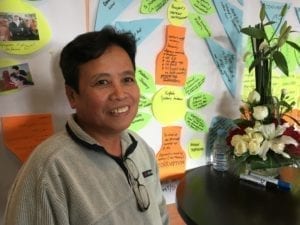
Adoracion Salvador Bunag plans to share with other domestic workers the strategies she learned at the Solidarity Center Decent Work Forum. Credit: Solidarity Center/Tula Connell
For forum participants, the conference served as a springboard for moving forward with strategies for carrying out campaigns to improve the rights of domestic workers and farm workers.
“This dialogue is not going to stop here,” says Saida Ouaid, CDT executive board member and coordinator for programs covering women and migration. “It will be further conveyed here through our institutions.”
“I have learned a lot from this forum and I will able to share it with my fellow domestic workers in Jordan,” says Adoracion Salvador Bunag, a domestic worker from the Philippines working in Morocco.
“As we move forward we will implement what we learned here,” says Hanan Laawina, a Morocco farm worker in Meknes El Hajeb.
“What is being talked about here is kind of stuff that is real and when I go back to work, I can speak from a position of strength when advocating for our rights,” she says.
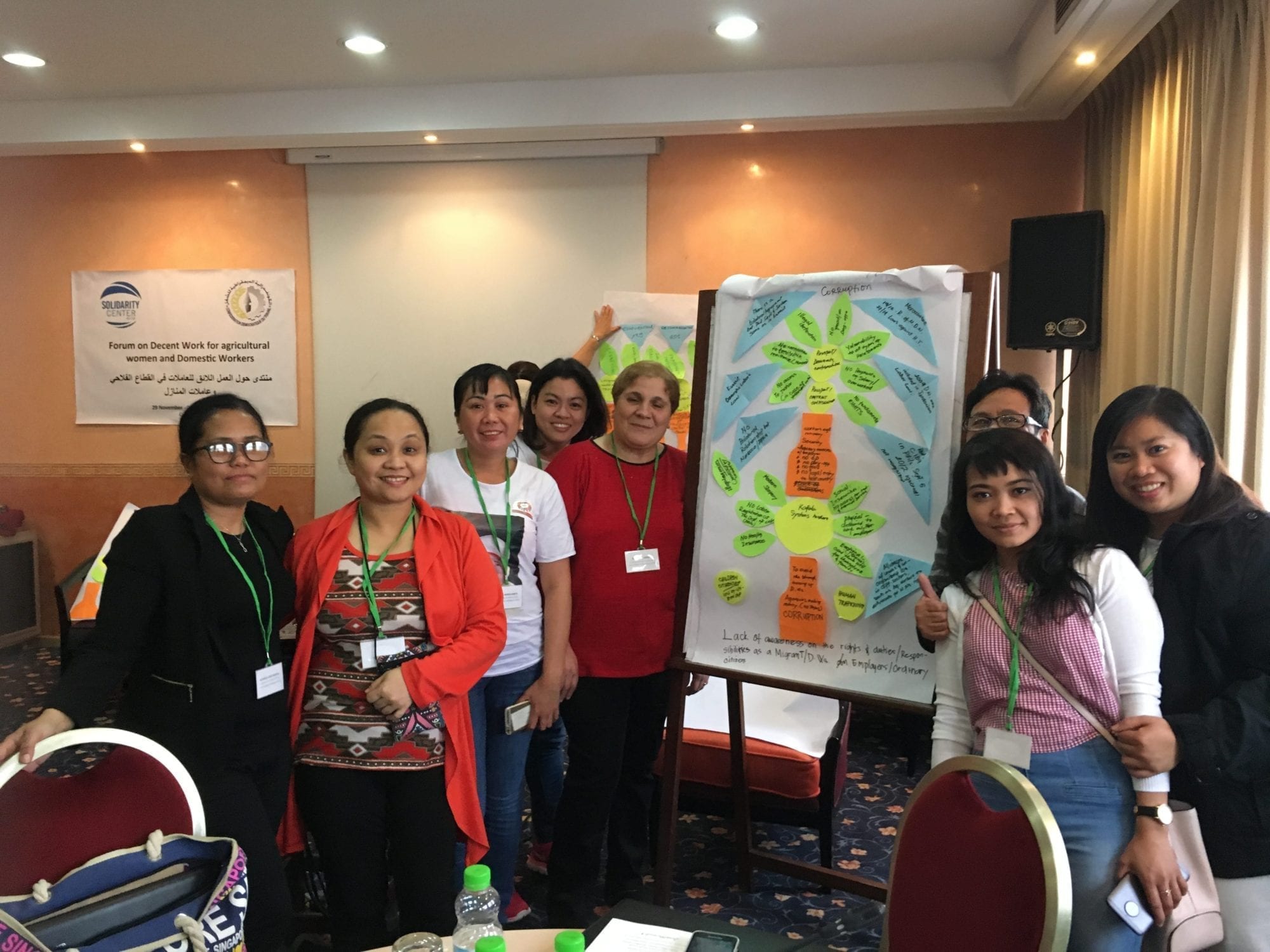
Nov 30, 2017
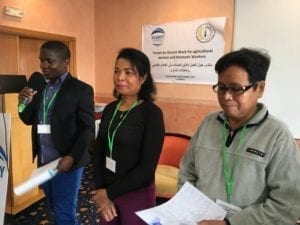
Romaric Hocine, Marie Constant and Adoracion Salvador Bunag shared domestic workers’ success stories. Credit: Solidarity Center/Tula Connell
Following heartfelt rounds of songs on workers’ struggles and union solidarity, some 30 worker rights advocates launched the second day of the Forum on Decent Work for Agricultural Women and Domestic Workers. Discussions centered on the lack of migrant worker rights and the commonalities between the treatment of domestic workers and farm workers, and participants concluded the day by sharing success stories and best practices from around the world.
The November 29–December 1 forum in Casablanca, sponsored by the Solidarity Center and the Democratic Labor Confederation (CDT) in Morocco, includes representatives of unions and worker associations from Jordan, Kuwait, Lebanon and Morocco.
“We have to be aware of all the different ways our employers and governments try to divide us from each other,” says Erin Radford, Solidarity Center senior program officer for North Africa, opening the conference with small group discussions.
In conversation with each other and together as a group, forum participants explored how migrant workers often are paid lower wages than a country’s standard minimum wage, are prohibited from forming unions and typically are not covered by basic social protections, like pensions. Gender also is a key dividing line at work, and participants shared how women are treated as lesser than men at work, even as they take on most of the care burden at home.
These divisions, says Radford, are how employers “can increase their control over workers and exploit them.”
‘Labor Is Not a Commodity’
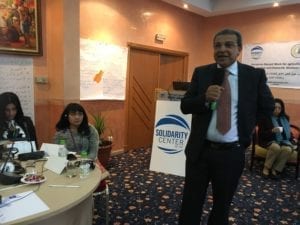
‘Labor is not a commodity’—Mohamed Korri, labor relations expert and former consultant in the agricultural sector. Credit: Solidarity Center/Tula Connell
Divisions in labor rights between farm workers and non-farm workers are especially acute in Morocco, says Mohamed Korri, a labor relations expert and former consultant in the agricultural sector. As part of a panel presentation with experts on decent work and migration, Korri listed the ways in which farm workers have fewer rights and protections than other workers: they are paid less than the standard minimum wage, they are not eligible for paid holidays and they face such strict pension restrictions they rarely qualify for paid retirement.
There is little incentive for legislators to improve the laws, he said, because many own farms and benefit from worker exploitation. “Labor is not a product, not a commodity and must be treated humanly,” he says.
Also on the panel, Bachir Znagui, a media professor from the HEM Research Center, overviewed the conditions of domestic workers and migrant workers in Morocco and the international conventions covering their rights, and shared best practices from countries around the world, including Uruguay, which requires labor inspections of the homes of those employing domestic workers.
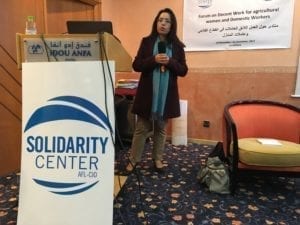
Freedom to form unions is a key pillar of decent work, says Fatima Idahmad, ILO representative in Morocco. Caption: Solidarity Center/Tula Connell
Znagui’s presentation showed that growing numbers of workers are forced out of formal-sector employment and into jobs with low wages and no social protections or job security—hitting women and migrant workers the hardest because they comprise the majority of workers in the informal economy. The increase in low-paying, temporary jobs is fueled by a rise of corporate rights and corresponding decrease in worker rights around the world.
Key to decent work is the freedom to form unions, the elimination of child labor and forced labor and the elimination of workplace discrimination, says Fatima Idahmad, national coordinator for the International Labor Organization (ILO) in Morocco. Idahmad highlighted how the ILO is raising awareness among workers about their rights throughout Morocco.
Strategies for Success
Working together—across organizations, job categories and countries—workers can push back against global corporate forces and unsupportive governments. And in sharing success stories, forum participants began crafting strategies to take back to their workplaces.
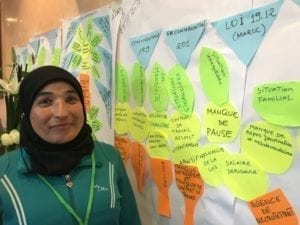
Farm worker and CDT member Hayat Khomsi says a union contract has completely transformed the conditions under which farm workers toil. Credit: Solidarity Center/Tula Connell
Marie Constant, a domestic worker in Lebanon originally from Madagascar, was among activists who led the formation a domestic workers’ union in that country, the first of its kind in the region. Constant described how union members, nearly all of whom are migrant workers, receive key support from National Federation of Employees’ and Workers’ Unions in Lebanon (FENASOL).
“Even if we know we have a long way to go, that there are a lot of hurdles along the way, we are advancing not regressing,” she says, speaking through a translator.
A union contract has completely transformed the conditions under which farm workers toil on Les Domaines Brahim Zniber farm, says Hayat Khomsi, a farm worker in Meknes El Hajeb and activist with the CDT.
Under the landmark 2015 agreement, which now covers 1,200 workers on six farms, workers for the first time have formal employment contracts with job security, paid leave and other social protections. Crucially, women now have equality with men, enabling the women farm workers, who previously were blocked from “male” jobs, like truck driving, access to these generally higher paying jobs.
“Now we have achieved a similar status to that of the men,” says Khomsi. “Now I am a team leader and before no woman could have been a team leader.”
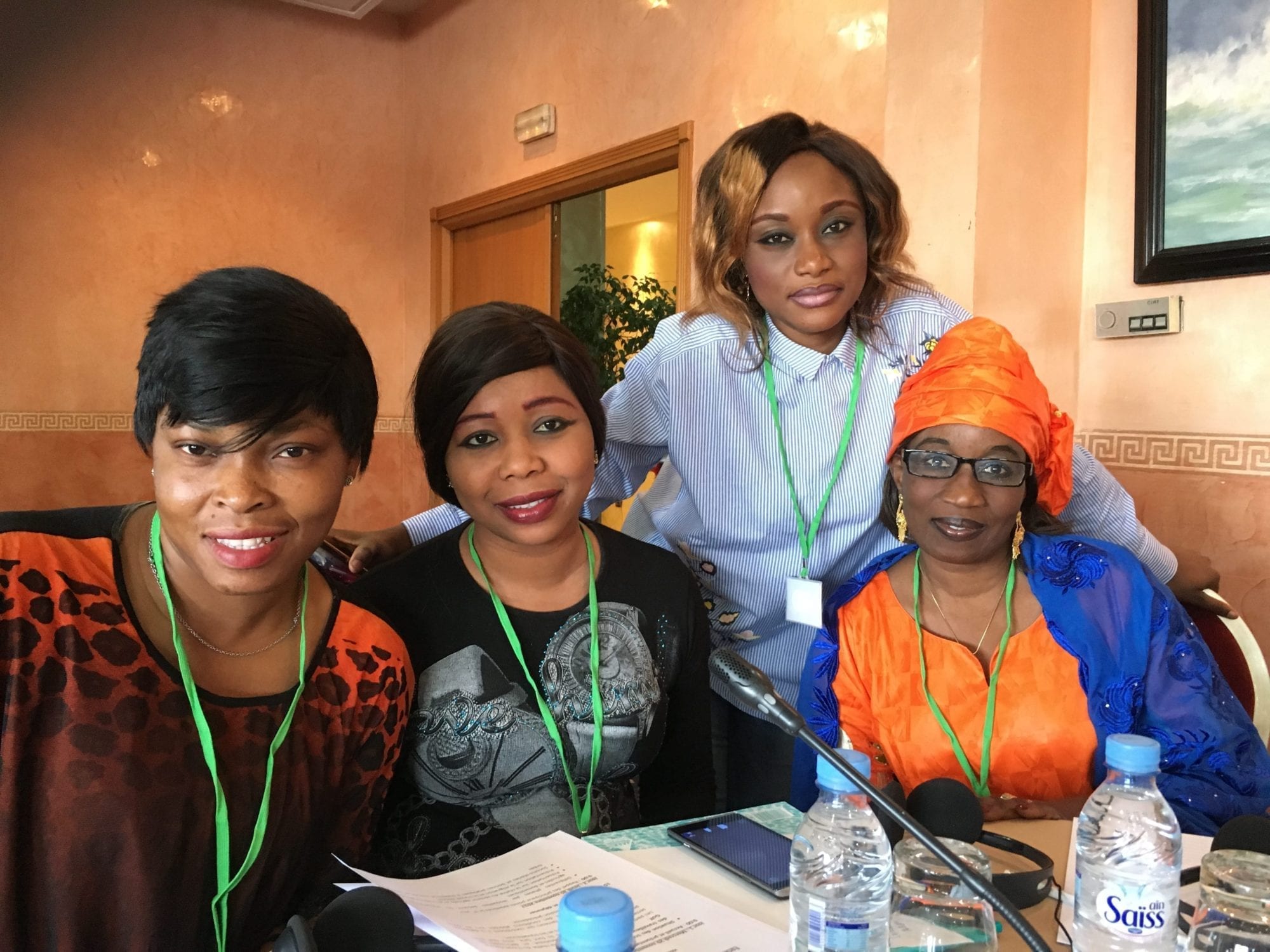
Nov 29, 2017
To promote the rights of women workers, especially women domestic workers and women farm workers, it is essential to seek solutions to build women’s capacity to defend their rights to equality, decent work and an end to violence and abuse, according to Hind Cherrouk, Solidarity Center director for North Africa as she opened a three-day forum in Casablanca, Morocco, this morning.
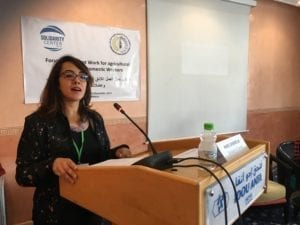
“This forum is an opportunity to build solidarity between women domestic workers and farm workers”–Hind Cherrouk, Solidarity Center program director for North Africa Credit: Solidarity Center/Tula Connell
“This forum is an opportunity to build solidarity between women domestic workers and farm workers,” says Cherrouk.
“We express our solidarity with our sisters who are migrants,” says Saida Bentahar. “We will always stretch our hands out to help them. We are going to remove the pressure of discrimination against our sisters wherever they are.” Bentahar, a Democratic Labor Confederation (CDT) women’s committee member, works to empower farm workers in Meknes El Hajeb, Morocco.
Some 30 worker rights advocates from countries that include Jordan, Kuwait, Lebanon and Morocco are meeting to discuss how such factors as gender, ethnicity and race are used to deny workers their rights and, ultimately, to build the connections and solidarity needed to take on the power structures that profit from their marginalization. The November 29–December 1 Forum on Decent Work for Agricultural Women and Domestic Workers is sponsored by the Solidarity Center and the CDT.
“If you don’t fight, nothing will happen,” says Elizabeth Tang, general secretary of the International Domestic Workers Federation. Tang, who spoke during the morning session, described how domestic workers around the world came together to fuel the 2011 passage of the International Labor Organization (ILO) Convention 189 on domestic workers, and later created IDWF.
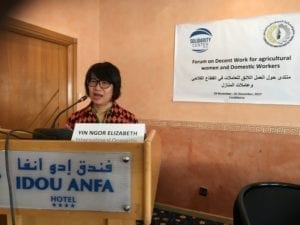
“If you don’t fight, nothing will happen”–Elizabeth Tang, IDWF secretary general Credit: Solidarity Center/Tula Connell
“If domestic workers stop fighting, then the convention will just be a nice looking paper,” says Tang. “So we decided to form a permanent union of domestic workers so we can keep fighting in unity so we can speak in one voice.” IDWF now includes 65 affiliated organizations in 53 countries.
More than half of the workers around the globe are not employed in the formal economy. Yet most informal economy workers, such as those cleaning houses and toiling on farms, have little access to decent work—which includes family-supporting wages, safe workplaces and social protections like paid time off and pensions. Decent work is one of the United Nation’s sustainable development goals, a series of targets the UN hopes to achieve by 2030.
Representing a range of unions and associations assisting workers throughout the Middle East and North Africa, participants described the challenges they face as domestic workers and agricultural workers and how, as worker rights activists, they are facilitating efforts through their organizations to achieve decent work.
Isolated in Homes, Domestic Workers Vulnerable to Abuse
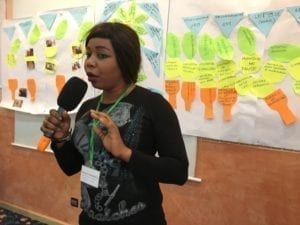
Camara Hassanatou, a domestic worker in Morocco, described how her employer forced her to work without rest. Credit: Solidarity Center/Tula Connell
Of the more than 150 million migrant workers in the world, 11.5 million are migrant domestic workers. Primarily women, domestic workers provide essential support to families, cleaning homes, cooking meals and taking care of children. Yet their isolation makes them especially vulnerable to abuse and exploitation.
“I asked my employer how long I will work,” says Camara Hassanatou, an African migrant worker in Morocco. “ ‘You will work as long as I tell you,’ she said.” Hassanatou accepted the job because she needed to support herself. Yet she received no time off, even when she was ill.
Now an activist with the Coalition of Migrant Workers in Morocco (CTMM), Hassanatou joined participants in small group discussions in which domestic workers and farm workers shared their challenges. The women discussed how migrant domestic workers often are recruited by labor brokers who lie to them about the wages and working conditions in destination countries. After they are arrive in another country, their passports and mobile phones often are taken, trapping them in employment situations where they often face physical and sexual abuse, while forced to work long hours with no time off.
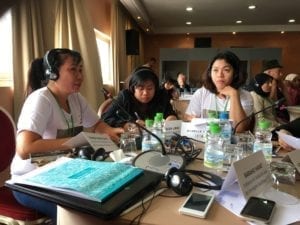
Former domestic workers from the Philippines were trafficked to Morocco and now are part of the Instance of Solidarity with Asian Workers. Credit: Solidarity Center/Tula Connell
Romaric Hocine, a member of the CTMM, which was formed in 2013, outlined how the organization works to educate migrant domestic workers about their rights. Under a recent legalization campaign by Morocco, migrant workers who have been employed for five years in the country, among other criteria, were eligible for amnesty if they applied in 2014 and 2015 and renewed in 2016. CTMM activists reached out to workers across the country to enable them to get formalize their status and attain basic rights.
Leadership training is central to the coalition’s work: “It is essential to develop leadership among migrant workers so they can defend their own rights,” he says.
From Kuwait, where two-thirds of its population is comprised of migrant workers, Mai al Tararwah, a lawyer with the Humanitarian Foundation for Legal Aid, described how a team of lawyers works to assist domestic workers and other migrants with legal support and vocational training. Farah Abdullah from the National Federation of Employees’ and Workers’ Unions in Lebanon (FENASOL) discussed the union’s objectives, which include creating “an independent structure for migrant domestic workers” in that country, where an estimated 250,000 migrant labor as domestic workers.
Farm Workers ‘Treated Like Slaves’
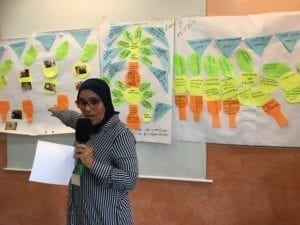
“Trade unions can reverse the factors that undermine vulnerable workers in society”–Saida Bentahar, a CDT women’s committee member Credit: Solidarity Center/Tula Connell
Many workers on agro-industrial complexes are seasonal employees and, like domestic workers in many countries around the world, they are not covered by national labor laws guaranteeing minimum wages and social protections like pensions and paid time off.
Rural women now contribute half of the world’s food and women in developing countries generate between 60 percent and 80 percent of the labor needed to produce food crops in developing countries.
Yet women working in agriculture “are being dismissed without pay, without severance, without justification with the stroke of the employer’s hand,” says Bentahar. “If they feel that the margins do not add up, employers will quickly lay off of women workers.”
Globalization has strengthened the negotiating hand of corporations at the head of supply chains. Faced with pressure to maximize profits, factory and farm managers typically pass on the costs and risks to the weakest links in the chain: the workers they employ.
Participants agreed that although domestic workers and farm workers may face different challenges, the common thread uniting their struggles is a lack of worker rights. But as Bentahar pointed out, unions provide a key path forward for many workers.
“Trade unions can reverse the factors that undermine vulnerable workers in society,” she says. “Our capital is our ablility to put pressure on our governments. We’d like your governments to put pressure on our governments to create momentum.”
“Things are changing,” says Tang. “You don’t have to look very far. Just look at yourselves.
“Together, we will make change.”
Stop back tomorrow for more coverage of the Forum on Decent Work for Agricultural Women and Domestic Workers.
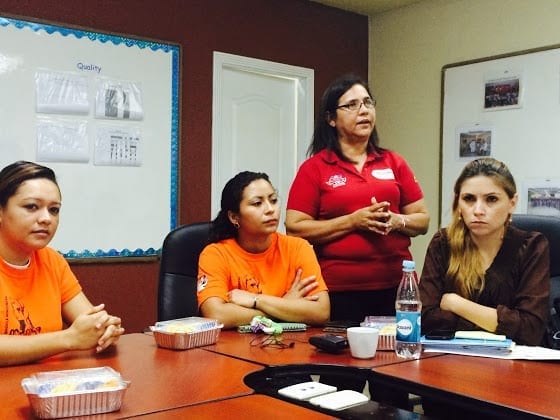
Nov 9, 2017
In Honduras, union leaders are on their way to successfully negotiating eight collective bargaining agreements covering 21,000 garment workers who have joined unions in the past few years. Contracts negotiated so far include 23 percent wage increases, free transportation to and from work, free lunch, additional severance pay for workers recovering from ergonomic-related illnesses, and educational funds for workers and their children.
Five of those agreements will be first-ever pacts for 17,350 workers, says Evangelina Argüeta Chinchilla, coordinator of organizing maquila workers in the northern Choloma region for the General Workers Central (CGT) union confederation.
Argüeta Chinchilla, whose efforts to improve factory workplaces and whose training among women garment workers is enabling them to take leading roles in their unions and communities, will be honored along with the Honduran union movement November 15 at the Solidarity Center 20th Anniversary celebration in Washington, D.C.
The evening event features AFL-CIO Secretary-Treasurer Liz Shuler and also will honor U.S. Sen. Sherrod Brown for his leadership to protect worker rights and the brave Colombian union and community activists for their frontline-efforts to achieve social justice in their country. And special guest U.S. Rep. Karen Bass will deliver remarks. (There’s still time to sponsor the event or buy tickets to attend!)
The day begins with a launch of the Solidarity Center-support book, Informal Workers and Collective Action: A Global Perspective, and panel discussions featuring U.S. Rep. Pramila Jayapal and international worker rights activists. (Find out more about the free book event and RSVP here.)
Honduran Unions ‘Persevere on Behalf of Workers and Their Families’
In a country where in recent years union leaders have been harassed, attacked and even murdered, and where employers utilize hardball tactics to prevent workers from forming unions and bargaining contracts, the stunning success of the garment workers in achieving fundamental workplace rights is a “testament to the determination of the Honduran union movement to persevere on behalf of workers and their families,” says Solidarity Center Executive Director Shawna Bader-Blau. “Together, they are helping to ensure that workers have living wages, just and fair workplaces and the opportunity to improve the future of their children.”
Argüeta Chinchilla is emblematic of these dedicated activists. She began work in a maquila at age 15, where she toiled for nine years and was a founder of the union at her factory before becoming a full-time organizer for the CGT. With Argueta’s leadership, Honduran garment-sector unions have negotiated historic worker rights agreements with two major U.S. clothing brands, Fruit of the Loom (2009) and Nike (2010), that laid the groundwork for successive organizing and collective bargaining achievements.
She and other women unionists hold leadership trainings with assistance from women’s rights organizations and the Solidarity Center. Argüeta Chinchilla hopes to see women “exercising power proportional to the numbers we represent in the world, in the labor movement.”
Empowered women now ensure their concerns are reflected in bargaining agreements. Some of the contracts garment workers have negotiated so far grant women who have just given birth additional paid leave beyond the 12-week maternity leave they receive under Honduran law.
“This is important, because a lot of times women workers must resign because they don’t have anyone to take care of their baby, especially in the early weeks, and this will help them get through that period,” says Argüeta Chinchilla, speaking through a translator.
Expanding Democracy Through the Freedom to Form Unions
International solidarity with Honduran workers has been key to furthering their efforts to achieve decent jobs. In November 2009, Russell Athletic agreed to rehire 1,200 workers in Honduras who lost their jobs when the company closed the factory in an attempt to bust the union, after the union—with support from the Solidarity Center and the United Students Against Sweatshops—convinced 110 U.S. universities to cut their apparel contracts with Russell.
Since then, says Argüeta Chinchilla, “it is very evident that significant protections have been made—workers are more educated about their rights, there is more respect for freedom of association and collective bargaining, and improvements such as health and safety for workers.
“There is always the fear of losing your job, but less now than what happened in past.”
Earlier this year, a four-year campaign by Honduran labor unions to improve workplaces and strengthen the rights of workers culminated with the Honduran National Congress approving a new labor inspection law. The law promotes, monitors and is designed to ensure that workplace standards, safety and health provisions, and social security requirements are upheld. It includes financial penalties for violations of worker rights, including the right to form unions.
Argüeta Chinchilla knows that such success begins through empowering workers, especially women workers, to take active roles in their unions.
“The internal democracy of unions has improved,” says Argüeta Chinchilla. “Many more women are active in union leadership, and this has translated into civil society: Workers are more participative in democracy and government and the country in general.”
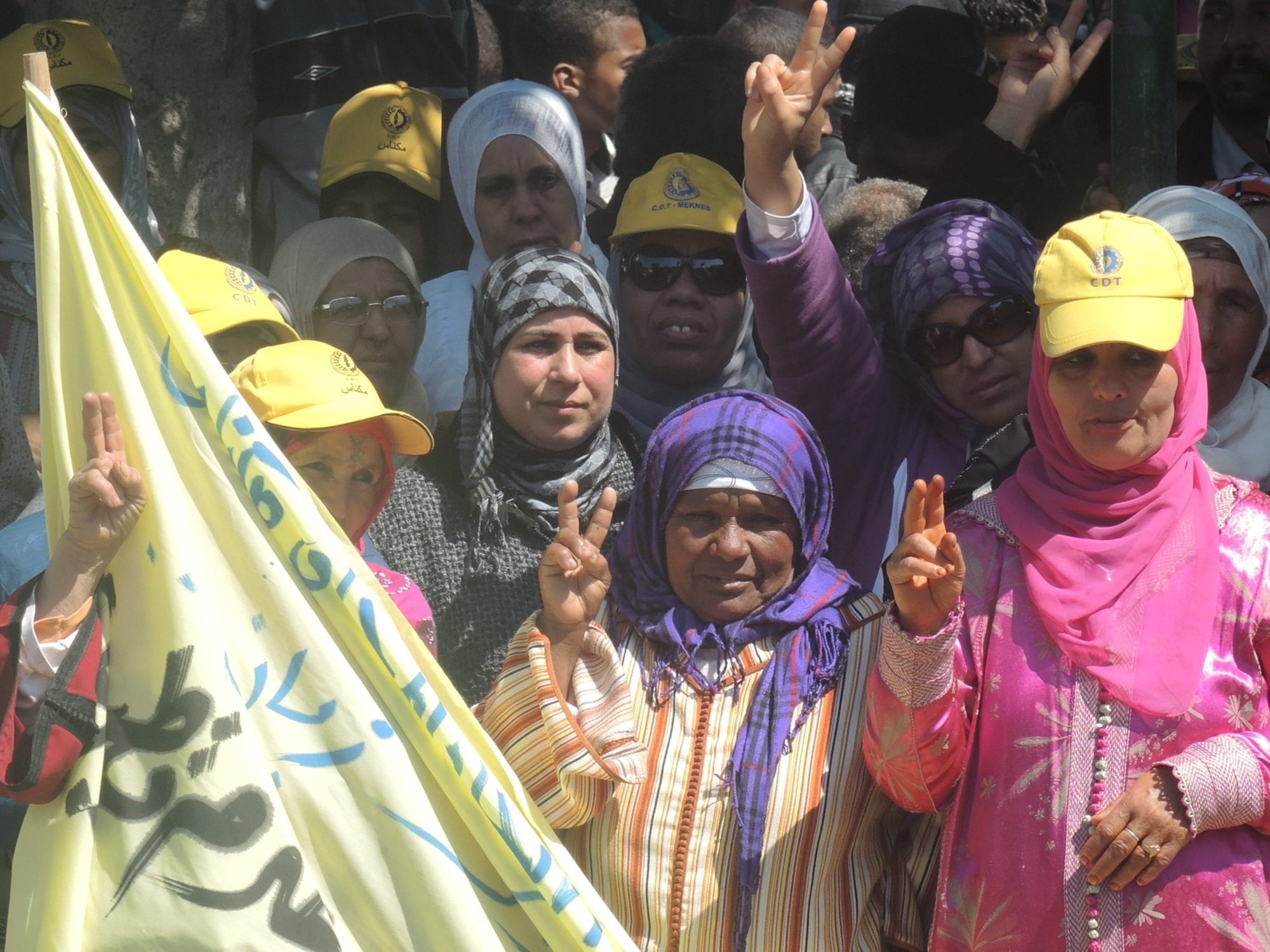
Oct 28, 2017
Agricultural work remains one of the most dangerous in the world. And women, who comprise between 50 percent and 70 percent of the informal workforce in commercial agriculture, are especially vulnerable to sexual harassment, physical abuse and other forms of gender-based violence at work.

Through gender equality training, Touriya Lahrech has enabled women farm workers to stand up for their rights. Credit: Solidarity Center/Hind Cherrouk
In Morocco, where the Solidarity Center partners with the Democratic Labor Confederation (CDT) to improve worker rights, the first step in addressing gender-based violence in the agricultural sector is enabling women to recognize its detrimental impact, says Touriya Lahrech, coordinator of the CDT’s Women Department and part of its executive board.
When women understand how gender-based violence at work is part of a larger structural system preventing them from attaining better wages and decent working conditions, they can go on “to denounce these kind of practices and exercise their rights,” she says, speaking through a translator.
As the United Nation commemorates November 25 as the Day for the Elimination of Violence against Women, the Solidarity Center and allies throughout the international labor, human and women’s rights communities are working with the International Trade Union Confederation (ITUC) to campaign for an International Labor Organization (ILO) convention to stop violence and harassment at work. (The ITUC campaign toolkit includes talking points, resources and tips for lobbying your government.)
November 25 also launches 16 Days of Activism against Gender-Based Violence Campaign, a time to galvanize action to end violence against women and girls around the world.
Empowered Women Propel Landmark Bargaining Agreement
In Morocco’s fertile fields outside Meknes, some 1,000 agricultural workers on five large farms won a landmark contract in 2015 that boosted wages, provided safety equipment and other fundamental protections. Since then, union leaders have negotiated an extension of the contract to 200 additional workers at another large farm.
The success of the multi-year effort to achieve the agreement stems in large part from the gender equality trainings by CDT and Solidarity Center. Launched in 2007, the trainings enabled women to understand their rights and to take steps to improve their difficult conditions, says Lahrech.
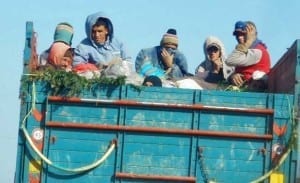
Agriculture workers in Meknes, Morocco, head to work. Credit: Solidarity Center/Hind Cherrouk
The women help determine the issues important to them and also design their trainings, which are conducted through role play because many are illiterate. “The fact that they participate in the design of the role play which builds on their own experiences” is especially meaningful and effective, says Lahrech. Engendering conversation and listening instills participants with the value they deserve, she says.
Lahrech describes how women who initially sat in the back of the room too fearful to speak, have gone on after the trainings to take the microphone at massive rallies on Women’s Day and in CDT meetings where they articulated their rights.
The contract, reached with agro-industry employer, Les Domaines Brahim Zniber, includes first-ever maternity leave, a key demand of the women workers. The contract also is especially important for women because they now have equality with men, says Lahrech. Equality with men means women, who previously were blocked from “male” jobs, like truck driving, now have access to these generally higher paying jobs. “When women can drive trucks, they earn more pay and that is better for everyone,” she says.
Further, the agreement provides employment security for all workers, who had been classified as seasonal and so not eligible for social protections like pensions and health care. The precariousness of agricultural work is compounded by informal employment arrangements driven by the seasons when cash crops are planted and harvested.
Unions Key to Social and Economic Improvements
Lahrech, who also serves as a member of the ITUC’s Women’s Committee and the Arab Trade Union Confederation Women’s Committee, is a long-time union advocate who began working with agricultural workers after she discovered how women in the sector are “at the mercy of the employer, with no social security, no retirement, and in general, not many rights due to the lack of contract.”
Sparked by her participation in student protests, Lahrech made it her life’s goal to effect positive societal change—and soon realized the most effective means to do so is through unions.
“We can’t make the social and economic system change without union involvement,” she says. “When I saw the divide in social classes, I revolted, but I found the frame to challenge this anger—through trade unions.
“Together with others in the union, we share, through solidarity, because things can change with solidarity.”





















